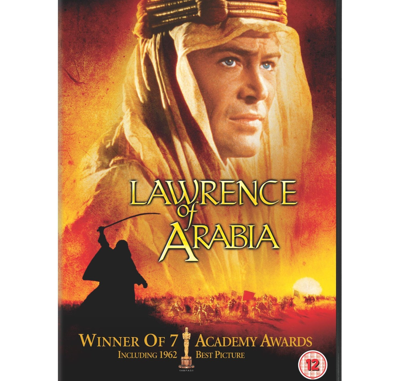
Starring more sand than you ever see on holiday this is a languid bio-pic co-starring the exquisite Peter O’Toole. Everyone has heard of it but fewer people have sat down and watched the whole thing non-stop. At 216 minutes long it has earned the right to be called epic, but the story and the composition of the shots make it an epic three times over. Images stay with you, images that you will never see in any other film. Camels racing across the desert, soldiers charging down sand dunes, horses leaping off trains. It is a remarkable achievement and is not to be judged by the standards of other mere films. This is over three hours of love for what cinema can achieve. Lawrence of Arabia is a milestone in cinematic history, a moment when subject, location and story all came together in harmony.

Lawrence is regarded highly along with such films as Citizen Kane – whose biographical structure it borrows. An early death is followed by journalists asking questions to get at the facts of the subject’s life. Directed by David Lean it won seven oscars when released in 1962 and was nominated for three more. The only disappointment is that O’Toole should really have won the oscar for best actor which instead went to Gregory Peck for To Kill a Mockingbird. O’Toole’s performance is gargantuan, conveying the essence of the conflicted character that Lawrence had. The score was composed by Maurice Jarre, father of Jean Michel Jarre, the French electro-pop composer. He created the rousing music in less than six weeks.
Of course the almost infinite landscapes that Lean photographs are vital to the success of Lawrence the film. Not only are they stupendous to look at, but the huge expanses do not have to be imagined. You can see how much the landscape – shot in Jordan and Morocco – plays in men’s lives, that if a camel gets injured the riders will die. In the broad sweep of history the film is a primer in Middle Eastern politics and fighting but unfortunately the film is not historically accurate in the small details. Lawrence’s brother is recorded as saying that ‘I should not have recognised my own brother.’ Lowell Thomas, the American journalist who met with Lawrence in the desert for several weeks has said that the only accurate parts of the film were the train attack scenes. Families of other characters in the film have complained about their portrayal and some descendants have even sued the production company.
A film has different needs to a documentary. There has to be a dramatic tension, especially in a three hour film. The film-makers were making something based on the life and experiences of Lawrence that they hoped would be a success. To this end they merged characters, changed dates and personalities. If they had been making a documentary it would have been inexcusable, but they were making an entertaining film.
Lawrence of Arabia always comes near the top of best-film-ever contests. To modern audiences it is absurdly long, but it is well worth the investment of time. Recommended.

Leave a Reply